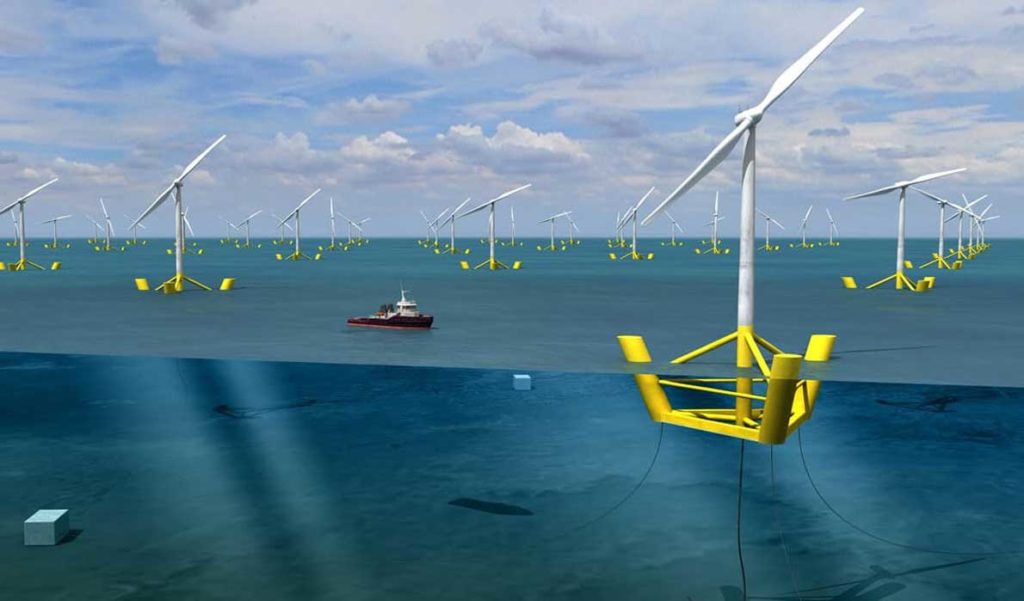Gov. Janet Mills has signed into law LD 1619 which prohibits new offshore wind projects in state waters. The prohibition preserves state waters for recreation and fishing—where up to 75 percent of Maine’s commercial lobster harvesting occurs—and cements into law its priority of locating wind projects in federal waters in the Gulf of Maine.
The new law comes after Mills last month signed into law another bill which advances the creation of the nation’s first research area for floating turbines in federal waters.
Recent studies have indicated offshore wind represents a nearly $70 billion opportunity over the next decade.
Federal jurisdiction over ocean waters begins at three miles from state land.
Mills said she was pleased with the bipartisan support from legislators in advancing the state’s potential to grow a global offshore wind industry which will:
• create good-paying jobs for Maine people
• support Maine’s transition to 100 percent renewable energy
• and help fight climate change
The new law also reflects the Mills administration’s approach to offshore wind, according to the governor’s office, and stems from extensive discussions among the Governor’s Energy Office and Department of Marine Resources, along with fishing, wildlife, and environmental organizations aiming at responsibly pursuing wind power in co-existence with Maine’s maritime heritage.
The Gulf of Maine is home to some of the highest sustained wind speeds in the world. This makes offshore wind, a source of clean, renewable energy, a critical tool for cutting greenhouse gas emissions by reducing Maine’s nation-leading dependence on heating oil, aiding the expansion of clean transportation and clean heating solutions, and keeping at home some of the more than $4 billion Maine people spend annually to import fossil fuels, according to a press release on the governor’s office website.
Maine is prepared to create good-paying trades and technology jobs in offshore wind by advancing the University of Maine’s innovative floating offshore wind technology; forging public-private partnerships for research, development and workforce training; and investing in Maine’s deep-water ports, the governor’s office asserted.
Recent studies have indicated offshore wind represents a nearly $70 billion opportunity over the next decade.
These advancements come at a time when national and regional activity in offshore wind is increasing. In March, the federal government announced an aggressive target of 30 gigawatts of electricity from offshore wind by 2030 and its intention to open ocean leasing for commercial-scale offshore wind projects on the East Coast.
Around the same time, Gov. Charlie Baker of Massachusetts signed legislation that added 2,400 megawatts of offshore wind energy to that state’s existing renewable energy targets. With offshore wind estimated to become a $1 trillion global industry by 2040, it carries the potential to create thousands of new, good-paying jobs in clean energy, marine industries, and skilled trades.
Dan Burgess, director of Maine’s energy office, said the talks among stakeholder groups “helped inform a responsible plan to harness the abundant renewable energy available in the Gulf of Maine. Maine will need more sources of renewable energy to reduce our dependence on fossil fuels that are driving climate change.”
Sen. Mark Lawrence, D-York, said the moratorium on near-shore projects “will protect Maine’s fisheries and coastal waters and maintain Maine’s status as a leader in developing clean energy and fighting climate change.” Lawrence, chairman of the legislature’s Energy, Utilities, and Technology Committee, was the bill’s sponsor.
Jeremy Payne, executive director of the Maine Renewable Energy Association, said the law “conveys to the marketplace we won’t place projects anywhere and everywhere. We applaud Gov. Mills for leading these efforts and look forward to the significant boost offshore wind will provide to Maine’s burgeoning clean energy economy.”
Dana Connors, president of the Maine State Chamber of Commerce, also supports the plan, saying offshore wind is “an enormous opportunity for Maine’s energy and marine businesses to further strengthen the state’s economy. Maine’s companies are well positioned to seize this opportunity and build expertise for the 21st century, and I applaud the governor and the legislature for making this a priority.”





